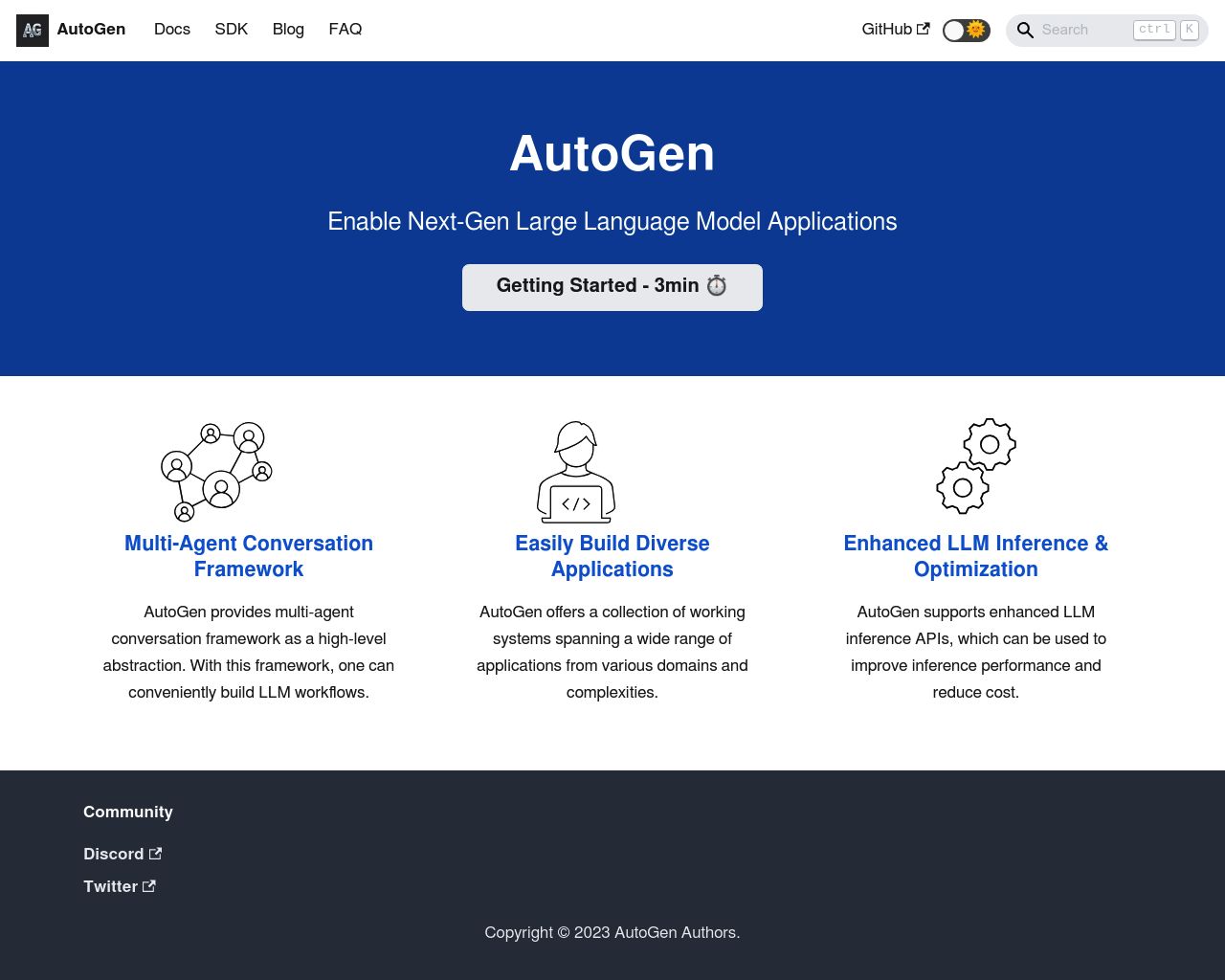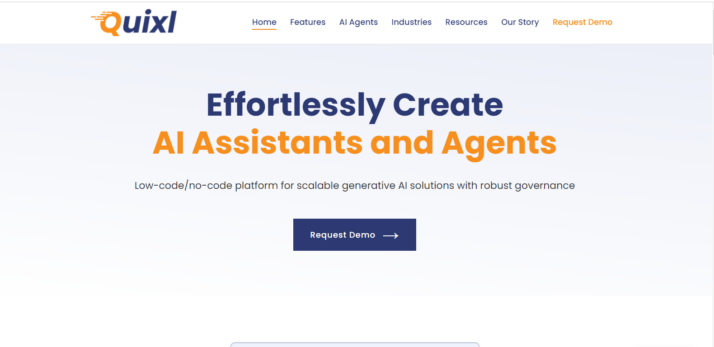AutoGen vs. Quixl AI: Comparing AI Development Platforms
AI development platforms revolutionize how businesses create and deploy intelligent solutions. AutoGen vs. Quixl AI, and SmythOS each offer unique approaches to building AI agents, catering to different levels of technical expertise and business needs. This comparison explores the strengths and limitations of these platforms, examining their core features, ease of use, and enterprise readiness. Whether you’re a developer seeking fine-grained control, a business leader aiming for rapid AI adoption, or a non-technical user looking to harness AI’s power, understanding these platforms’ capabilities will help you choose the right solution for your AI journey. Discover how each platform tackles multi-agent collaboration, no-code development, scalability, and integration, and learn which option best aligns with your organization’s goals and technical resources.
AutoGen Overview
AutoGen revolutionizes AI application development with its open-source framework for multi-agent conversations. The platform empowers developers to create sophisticated Large Language Model (LLM) applications by orchestrating interactions between customizable agents, LLMs, tools, and humans.


AutoGen’s core strength lies in its multi-agent conversation system. Developers can design agents that collaborate autonomously or with human input to tackle complex tasks. The framework optimizes LLM performance through advanced inference capabilities, including tuning, caching, and error handling. This approach maximizes the utility of powerful but resource-intensive models like GPT-4.
AutoGen’s core strength lies in its multi-agent conversation system. Developers can design agents that collaborate autonomously or with human input to tackle complex tasks.
The platform shines in its versatility, supporting a wide range of applications from automated task solving to code generation and complex problem-solving in group chats. AutoGen’s flexible architecture allows for both fully autonomous operations and human-in-the-loop scenarios, catering to diverse use cases across industries.
Developers benefit from AutoGen’s robust toolkit, which includes debugging features and comprehensive logging for API calls. These tools prove invaluable for optimizing LLM-based systems and ensuring transparency in agent decision-making processes. The inclusion of EcoOptiGen, a cost-effective technique for LLM tuning, further demonstrates AutoGen’s commitment to enhancing AI efficiency.
While AutoGen offers powerful capabilities, it requires coding knowledge for setup and configuration. This aspect may present a learning curve for non-technical users seeking to leverage AI agents. Additionally, the platform’s focus on code-based workflows means it lacks a visual builder or no-code editor, potentially limiting accessibility for some users.
Quixl AI Overview
Quixl AI, developed by Integra, offers a comprehensive platform for AI adoption across industries. The software leverages generative AI and large language models to streamline automation and boost productivity. Quixl’s standout features include a no-code AI agent builder, curated AI Agents Hub, and Prompt Studio for advanced customization.
The platform excels in supporting seamless AI integration, rapid deployment, and scalable growth. Its applications span various domains, from alt-text generation and manuscript assessment to enterprise knowledge search and content editing. Quixl caters to specific industries like Media and Entertainment, Publishing and EdTech, and Healthcare by enhancing user engagement, personalizing learning experiences, and automating administrative tasks.
Quixl AI represents the culmination of Integra’s extensive research and commitment to innovation. It provides a unified, scalable, and secure AI ecosystem that facilitates AI monetization and offers a robust API Gateway.
Quixl AI represents the culmination of Integra’s extensive research and commitment to innovation. It provides a unified, scalable, and secure AI ecosystem that facilitates AI monetization and offers a robust API Gateway. The platform ensures data security with advanced transfer mechanisms and supports both on-premises and cloud deployments, making advanced AI accessible to businesses of all sizes.


Quixl AI’s strength lies in its ability to simplify complex AI processes for users with varying levels of technical expertise. The platform’s no-code approach democratizes AI development, allowing businesses to create and deploy sophisticated AI agents without extensive programming knowledge. This accessibility, combined with its industry-specific solutions, positions Quixl as a versatile tool for organizations looking to leverage AI in their operations.
While Quixl AI offers a robust set of features, it’s worth noting that some advanced capabilities like a visual builder or hosted vector database are not explicitly mentioned in the available information. Additionally, the platform’s focus on pre-built solutions may limit customization options for highly specialized use cases. However, these potential limitations are balanced by Quixl’s strong emphasis on scalability, security, and integration capabilities, making it a solid choice for businesses seeking to implement AI solutions efficiently.
Feature Comparison
AutoGen and Quixl AI offer distinct approaches to AI agent development, with notable differences in their core components and security features. AutoGen excels in multi-agent collaboration, providing a flexible framework for developers to create sophisticated AI systems through code. Its strength lies in facilitating complex interactions between multiple agents, humans, and external tools. AutoGen supports autonomous operations and human-in-the-loop scenarios, making it adaptable for various use cases.
Quixl AI, on the other hand, focuses on simplifying AI adoption with its no-code AI agent builder and curated AI Agents Hub. This approach makes AI development more accessible to users without extensive programming knowledge. Quixl AI’s emphasis on rapid deployment and industry-specific solutions sets it apart, catering to sectors like Media and Entertainment, Publishing, and Healthcare.
In terms of security, AutoGen’s documentation lacks explicit mentions of data encryption or constrained alignment features. Quixl AI, however, highlights advanced data transfer mechanisms and secure deployment options, including on-premises solutions. This suggests a stronger focus on enterprise-grade security measures in Quixl AI’s offering. Both platforms support API integration, but Quixl AI’s API Gateway and emphasis on scalability indicate a more robust infrastructure for enterprise deployments.
Feature Comparison Table
| AutoGen | Quixl AI | SmythOS | |
|---|---|---|---|
| CORE FEATURES | |||
| Visual Builder | ❌ | ✅ | ✅ |
| No-Code Options | ❌ | ✅ | ✅ |
| Agent Work Scheduler | ❌ | ✅ | ✅ |
| SECURITY | |||
| Constrained Alignment | ❌ | ✅ | ✅ |
| IP Control | ❌ | ✅ | ✅ |
| COMPONENTS | |||
| Data Lakes | ❌ | ✅ | ✅ |
| DEPLOYMENT OPTIONS (EMBODIMENTS) | |||
| Staging Domains | ❌ | ✅ | ✅ |
| Production Domains | ❌ | ✅ | ✅ |
| Deploy as Scheduled Agent | ❌ | ✅ | ✅ |
| DATA LAKE SUPPORT | |||
| Hosted Vector Database | ❌ | ✅ | ✅ |
| Sitemap Crawler | ❌ | ❌ | ✅ |
| YouTube Transcript Crawler | ❌ | ❌ | ✅ |
| URL Crawler | ✅ | ❌ | ✅ |
Best Alternative to AutoGen and Quixl AI
SmythOS stands out as the superior alternative to AutoGen and Quixl AI, offering a comprehensive platform for AI agent development and deployment. We’ve designed SmythOS to address the limitations of other platforms while providing unparalleled ease of use, an extensive feature set, and unlimited use cases.
Our visual builder sets SmythOS apart from AutoGen’s code-centric approach, allowing users of all skill levels to create sophisticated AI agents without extensive programming knowledge. Unlike Quixl AI’s industry-specific focus, we’ve built SmythOS to be versatile, catering to a wide range of industries and applications. This flexibility ensures that our platform can adapt to any business need or creative vision.
SmythOS stands out as the superior alternative to AutoGen and Quixl AI, offering a comprehensive platform for AI agent development and deployment.
SmythOS excels in areas where AutoGen and Quixl AI fall short. We offer robust security features, including constrained alignment and IP control, which are critical for enterprise-level deployments. Our platform also provides advanced deployment options like staging and production domains, scheduled agents, and integration with data lakes – capabilities not explicitly offered by AutoGen.
One of our key advantages is the seamless scalability of SmythOS. We’ve designed our platform to grow with your needs, whether you’re a small startup or a large enterprise. This scalability, combined with our hosted vector database and diverse crawler support, enables users to handle complex data processing tasks that may be challenging with other platforms.
By choosing SmythOS, users gain access to a powerful, all-in-one solution for AI agent development. We’ve created a platform that not only matches the capabilities of AutoGen and Quixl AI but surpasses them in critical areas. With SmythOS, we’re empowering users to build, deploy, and manage AI agents with unprecedented ease and efficiency, opening up new possibilities for innovation across industries.
Conclusion
Autogen, Quixl AI, and SmythOS each offer unique approaches to AI development and deployment, catering to different user needs and technical expertise levels. AutoGen excels in facilitating complex multi-agent collaborations, ideal for developers seeking fine-grained control over AI systems. Quixl AI simplifies AI adoption with its no-code approach and industry-specific solutions, making it accessible to a broader range of users.
However, SmythOS emerges as the superior choice, combining the strengths of both platforms while addressing their limitations. Our drag-and-drop interface surpasses Quixl AI’s no-code builder, offering unparalleled ease of use without sacrificing advanced capabilities. Unlike AutoGen’s code-centric approach, SmythOS democratizes AI development, allowing both technical and non-technical users to create sophisticated AI agents.
SmythOS stands out with its extensive integration ecosystem, supporting over 300,000 integrations and a wide array of AI models. This versatility, coupled with our “Create Once, Deploy Anywhere” philosophy, enables users to seamlessly integrate AI into existing workflows and deploy across multiple platforms. Our focus on scalability, security, and transparency addresses enterprise needs more comprehensively than either AutoGen or Quixl AI.
To experience the future of AI development and deployment, we invite you to explore our diverse range of AI-powered agent templates and create a free SmythOS account. With our risk-free trial offering unlimited agents and a 30-day money-back guarantee, you can unleash the full potential of AI for your business today.
Last updated:
Disclaimer: The information presented in this article is for general informational purposes only and is provided as is. While we strive to keep the content up-to-date and accurate, we make no representations or warranties of any kind, express or implied, about the completeness, accuracy, reliability, suitability, or availability of the information contained in this article.
Any reliance you place on such information is strictly at your own risk. We reserve the right to make additions, deletions, or modifications to the contents of this article at any time without prior notice.
In no event will we be liable for any loss or damage including without limitation, indirect or consequential loss or damage, or any loss or damage whatsoever arising from loss of data, profits, or any other loss not specified herein arising out of, or in connection with, the use of this article.
Despite our best efforts, this article may contain oversights, errors, or omissions. If you notice any inaccuracies or have concerns about the content, please report them through our content feedback form. Your input helps us maintain the quality and reliability of our information.
